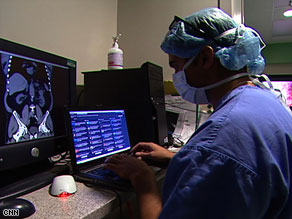Saturday, February 28, 2009
Tweeting Surgery
CNN.com recently posted this story of a surgeon who Twittered during a complex surgery.
It make me wonder how I might use Twitter as a teacher.
Any ideas?
Labels:
classroom 2.0,
social networks,
tools,
Twitter,
web2.0
Tuesday, February 17, 2009
You are Here?
An article in today's New York Times talks about the extensive use of maps as tools in various cell phone/SmartPhone applications:
It has been 25 years since the desktop, with its files and folders, was introduced as a way to think about what went on inside a personal computer. The World Wide Web brought other ways of imagining the flow of data. With the dominance of the cellphone, a new metaphor is emerging for how we organize, find and use information. New in one sense, that is. It is also as ancient as humanity itself. That metaphor is the map.
The piece goes on to connect maps with neuroscientists who believe that this type of representation of the world matches our internal brain functioning.
While interesting, I found the article a bit disappointing. I was hoping for a deeper analysis of how mobile computing has shifted how we handle information.
Labels:
edtech,
iPhone,
learning,
visualization,
web2.0
Thursday, February 5, 2009
This is a phone? This is a computer?
David Pogue had a nice piece in the NY Times celebrating a very cool application for the iPhone called Ocarina.
The application lets you hold down virtual "holes" and blow into the device (yes, blow). You are able to create music by doing this. Check out the video:
But there is another cool feature. I'll let Pogue describe it:
So, my questions are:
Is this (just) a phone?
What does this mean in terms of using technology for learning/communication/collaboration?
The application lets you hold down virtual "holes" and blow into the device (yes, blow). You are able to create music by doing this. Check out the video:
But there is another cool feature. I'll let Pogue describe it:
If you tap the little globe at the bottom of the screen, the screen changes. Now you see a map of the world--and you start hearing the Ocarina performance of one person, in one city (indicated by animated sound waves on the map), who's playing the thing *right now*. Sometimes it's the halting fumbles of a rank beginner; sometimes it's a lovely melody played by someone who's got the hang of it. You can hit a Next button to tune in to another stranger, and another, all around the world.
It's a brain-frying experience to know that you're listening to someone else playing Ocarina, right now, in real time, somewhere else on the planet. (And then you realize that someone, somewhere might be listening to *you*!)
So, my questions are:
Is this (just) a phone?
What does this mean in terms of using technology for learning/communication/collaboration?
Labels:
cool stuff,
edtech,
education 2.0,
iPhone,
Ocarina
Tuesday, February 3, 2009
The Wrong Question
This article reports on a study that looks at the difference in college student performance between students in a traditional Psych 101 class and peers who took the same class online.
Here are some results of the study:
I think this will naturally fall into a bigger discussion about technologically savvy students and how they learn better/differently and how college instruction must change. Etc. Etc.
I wonder if that is the wrong issue. Here's another quote from the article:
What do you think?
Here are some results of the study:
The online model, the study found, was particularly successful for disadvantaged or underprepared students - low-income students, racial and ethnic minorities, and those with low grades or ACT scores. And students in general do better in the class, too, earning a higher percentage of As and Bs than students earn in traditional Psych 101.
I think this will naturally fall into a bigger discussion about technologically savvy students and how they learn better/differently and how college instruction must change. Etc. Etc.
I wonder if that is the wrong issue. Here's another quote from the article:
"The way the class is set up, students have to spend a certain amount of time on the course material," Meadows said. "The second thing is that - and this is a particular bit of genius on Diane's part - the TAs and Diane play a very supportive role to students in the class. They're continually on the sidelines, asking if they have questions, asking if they need assistance. . . . It's a very nurturing environment that I think students respond to very well."So, were the positive outcomes the result of the physical learning environment (lecture versus online) or were they the result of the actual learning environment created by the instructors?
What do you think?
Subscribe to:
Posts (Atom)

